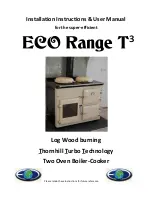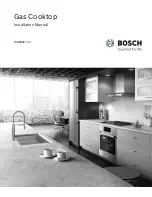
239
The gas connections are made on the
left or on the right (fig. 8.1) at the rear of
the appliance, in such a way that the
pipe never passes behind the cooker.
The end of the gas connection,
whether on the left or right, that is not
being used, must be closed by atta-
ching a cap fitted with a seal.
• Installation can only be carried out by
a qualified technician, and must con-
form with the local regulations in force
(NBN Standard D 51-003).
• The surfaces next to the cooker must
either be made of a heat resistant
material, or must be covered by such a
material.
• Ventilation of the room - the combus-
tion of gas can only occur because
there is oxygen present in the air. The
air must therefore be able to be rene-
wed, and the products of combustion
must be able to be expelled. The volu-
me of renewed air must be at least
2m
3
/h for each kW.
Gases normally used can be grouped
into two main families:
- Liquid Gas: Butane Gas (G30);
Propane Gas (G31)
- Natural Gas (G20/G25)
The cooker is supplied ready to operate,
using the type of gas which is indicated
on the label attached to it. Sometimes,
however, it may be necessary to change
from one gas to another.
Whatever type of gas the cooker is
designed for, the following procedures
must be followed:
• Connection to the gas supply.
• Replacement of the burners on the
cooking surface.
• Adjustment of the gas flow to the bur-
ners on the cooking surface.
Ensure that the cooker is equipped for
the type of gas it is to be supplied with
(see label ).
The gas supply circuit must conform
to the local regulations in force.
C)
CONNECTIONS TO THE GAS SUPPLY FOR:
Cat:
II
2E+3+
BE










































